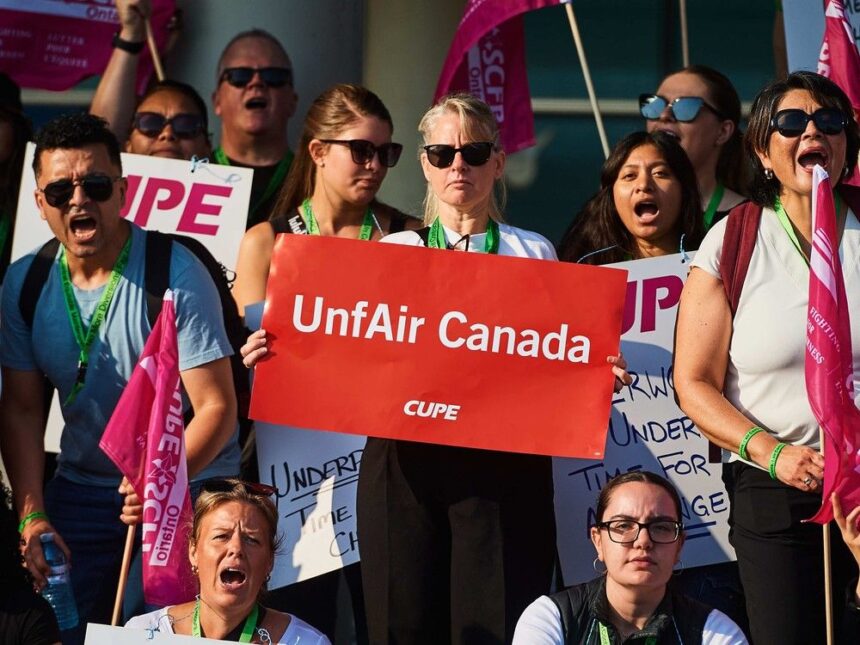In a dramatic turn of events that has reverberated throughout Canada’s transportation sector, the federal government stepped in late yesterday to halt the Air Canada flight attendants strike that threatened to ground thousands of flights and strand countless passengers across the country. Labour Minister Steven MacKinnon announced that both parties have agreed to binding arbitration, bringing a swift conclusion to a labor dispute that had created widespread uncertainty in Canada’s travel industry.
“After intensive discussions with both Air Canada and CUPE, I’m pleased to announce they have accepted my proposal for binding arbitration,” Minister MacKinnon stated during a hastily arranged press conference in Ottawa. “This agreement means Canadians can rely on their travel plans while ensuring a fair process for workers.”
The strike, which officially began at 12:01 a.m. yesterday, involved over 8,000 flight attendants represented by the Canadian Union of Public Employees (CUPE). While the job action was brief, it had already forced Air Canada to cancel approximately 300 flights, affecting an estimated 30,000 passengers during what industry analysts describe as the busiest travel season since the pandemic.
The core issues driving the strike centered on wages, scheduling flexibility, and crew rest periods. Flight attendants had been working without a contract since December 2023, with union representatives repeatedly highlighting that their members’ compensation had fallen significantly behind inflation while workloads increased substantially post-pandemic.
Air Canada, Canada’s largest airline, had initially prepared contingency plans that would have operated approximately 60% of its regular schedule using management personnel trained as flight attendants. However, aviation experts questioned the sustainability of such arrangements beyond a few days.
“This intervention by the federal government reflects the essential nature of air travel to Canada’s economy,” explained Dr. Miranda Chen, transportation economics professor at the University of Toronto. “With air transportation contributing approximately $27 billion annually to Canada’s GDP, prolonged disruption would have had cascading effects throughout various sectors.”
The Canadian economy has been particularly sensitive to transportation disruptions in recent years, with supply chain experts noting that post-pandemic recovery efforts remain fragile. The prospect of a prolonged airline strike raised concerns about impacts on tourism, business travel, and time-sensitive cargo transportation.
For passengers who experienced cancellations during the brief strike period, Air Canada has committed to providing full refunds or rebooking options. The airline expects to resume normal operations within 24 hours, though industry observers caution that residual disruptions may continue through the weekend as aircraft and crew positioning returns to normal.
World travellers connecting through Canadian hubs had been particularly concerned about the strike’s potential impacts. Toronto Pearson International Airport, which serves as a major gateway between North America and destinations across Europe and Asia, reported significant congestion yesterday as passengers sought information and alternative routing options.
The federal government’s intervention has drawn mixed reactions from political analysts. While some view it as a necessary step to protect critical infrastructure, others question the timing and implications for future labor negotiations in the transportation sector.
“This sets a precedent for how quickly the government might intervene in future labor disputes involving essential services,” noted political strategist Jonathan Reynolds. “It’s a delicate balance between respecting collective bargaining rights and protecting the broader economic interests of Canadians.”
The binding arbitration process is expected to commence within days, with both parties submitting their positions to an independent arbitrator. The resulting decision will be final and establish the terms of a new collective agreement between Air Canada and its flight attendants.
As Canadians adjust their travel plans in response to this development, a broader question emerges about the sustainability of our transportation infrastructure: In an era of increasing travel demand and complex global connections, how can Canada better balance the legitimate interests of transportation workers with the essential nature of the services they provide?










